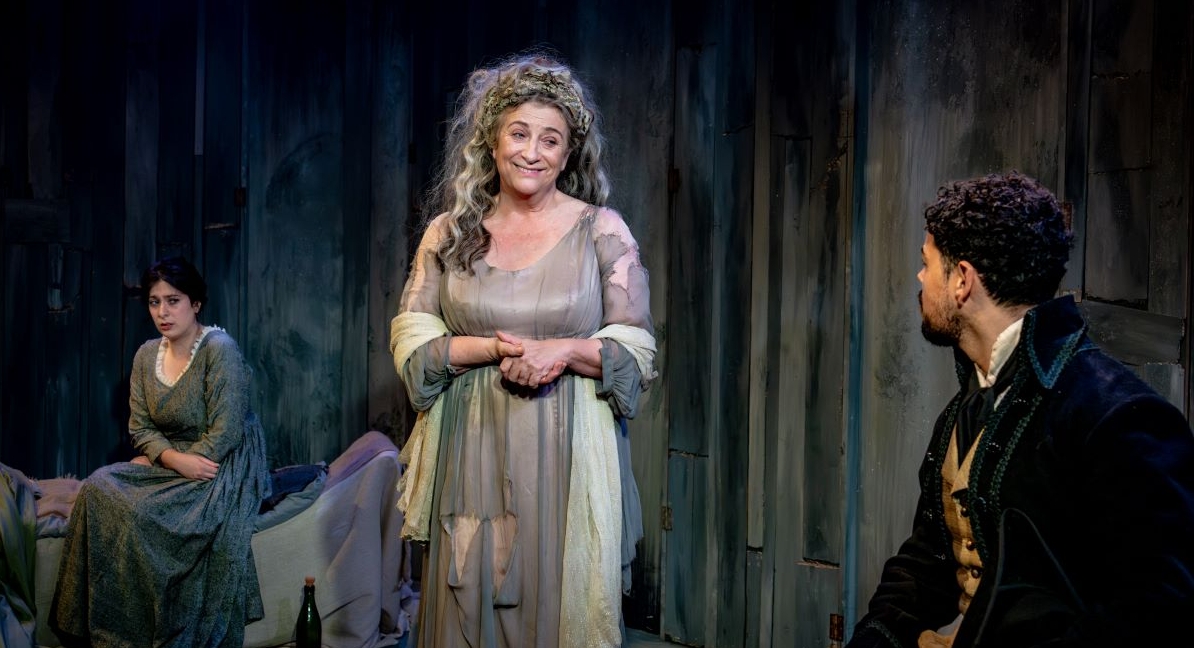The outlines of Emma Hamilton’s life-story were notorious in her own time and have remained part of high culture (eg Susan Sontag) or low culture (eg Blackadder) ever since. Born obscurely, and resorting at times to prostitution as she made her way in London, she nevertheless managed to marry the much older Sir William Hamilton, an antiquarian and ambassador to Naples; and from there she endeared herself to the Neapolitan royal family before landing an even bigger fish in the form of Lord Nelson, who landed in Naples just after his victory over Napoleon in Egypt. A scandalous three-way relationship followed, despite Nelson’s married status, and a child by Nelson too. Though he left her as a ‘bequest to the nation’ after his death at Trafalgar, she and Horatia (who did not know Emma was her mother) had to flee to France in debt where Emma died in penury in the year of Waterloo.
Such a story is readymade for treatment in film and cinema, where many versions already exist. What therefore can April De Angelis add? She chooses to focus on the relationships between mothers and daughters, with a first half showing a young Emma in Naples in 1798 on the verge of meeting Nelson and sparring with her mother Mrs Cadogan. Then in the second part we switch to 1815 with an aging and fading Emma living in a barn outside Calais at odds with her own daughter, Horatia. Just as in the musical ‘Six’ where Henry VIII looms over all but never appears, so we never meet the men, whether Nelson or Sir William, though their whims shape much of the action.
This is history with a light and flighty touch, and none the worse for that. It is not a deep dive into the politics of Naples and the Napoleonic Wars, nor is it really a serious attempt to reclaim Emma as a feminist heroine or oppressed victim. Instead it offers a wryly humorous look at the relationship between respectability and celebrity as applied to women, and presents a great vehicle for the comic talents of a real-life mother-daughter combo – Caroline and Rose Quentin. Caroline plays Mrs Cadogan in the first half and the raddled Emma of 1815; whereas Rose is the glamorous Emma in her prime and then the much put-upon Horatia nearly twenty years later. Riad Ritchie completes the cast in a couple of delightful character roles – an Italian servant who is in love with Emma, and then later on a well-meaning French peasant lad who tries to help the two distressed women.
As you would expect the rapport between the two actresses is seamless and the comic timing delightful. The dialogue is sprightly with some excellently witty lines punctuated with pools of melancholy that remind you of the unfair double standards against which Emma was continuously judged. Caroline Quentin is excellent as the wily survivor, Mrs Cadogan, who manages to outwit even her own daughter; and her later portrait of the older, blowsy Emma demonstrates the spirit and guile still present under physical decay – her display of Emma’s ‘attitudes’ – her poses drawn from Greek vase paintings – manage to be hilarious and wanly distressing all in one. Rose distinguishes carefully between the impetuous Emma of 1798 and the petulant, frustrated Horatia of 1815. She has a lovely interaction with Ritchie too as they try and fail (except through dance) to understand each other through the language barrier. Richie also make the very most of his earlier part with many knowing, pert interactions with the audience as much as with his fellow actors.
As ever at Jermyn Street the delightful intimacy of the venue brings out the best in both actors and creative team. The small-scale means that the most delicate of actorly interventions will register with the audience so the size of performances can be brought right down. Director Michael Oakley and designer Fotini Dimou have responded to the constraints of space with a delightful inventive set – the faded Rococo panels of the Palazzo Sessa reverse at the interval to provide the grim grey interior of a cow barn, which captures in one economical visual gesture the parallel reversal of Emma’s fortunes.
The evening will stimulate laughter and naughtiness, and a little serious reflection, while also scattering much delight – just as Emma, at her best, gave to the later eighteenth century. Performers, text and setting are all refinely crafted and craftily refined.

